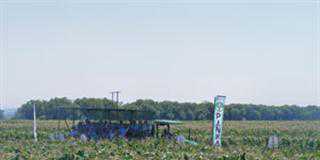What is the current status of erosion in South Africa?
Provisional data from the Land Degradation Assessment in Dryland Areas (LADA) project shows it’s a major problem in all nine provinces. And it’s getting worse. Erosion has been going on for centuries, and we currently don’t have the ability to stop it. At best we can slow it down. The situation will keep getting worse and soil, one of our most important natural resources, will keep deteriorating if we don’t step up our mitigation and control efforts.
What are the implications of erosion for South Africa?
Obviously, we depend on productive land for food security. Roughly 80% of our land is used for agriculture, but only about 14% is considered arable. Mismanagement and the lack of soil conservation measures put these limited resources under threat. Soil is losing its ability to produce sustainable harvests. The population of South Africa and the world is growing faster than ever and we need to produce more food, faster, but our natural resources won’t get bigger. Erosion takes away productive soil, hampering our ability to produce enough food and threatening sustainable development.
There have been many media reports lately on the South Africa’s looming water crisis. Is the erosion problem as serious?
Definitely, but people aren’t as aware of it because water affects everyone directly, while soil affects most of us indirectly. Soil erosion is a slow process, and we sometimes get so used to the scars of it we don’t notice them any more. Surface erosion, where a thin layer of topsoil is washed away by rainwater over a large area, is hard to see, and there’s always food available in the supermarket.
Are there any formal structures in place to manage erosion control?
South Africa used to have a very effective system of soil conservation committees as part of Conservation of Agricultural Resource Act (Act 43 of 1983). At local, provincial and national level they coordinated soil conservation with the agriculture department and advised the minister on related issues. But after 1994, most of them fell away. There are remnants in some provinces, the Western Cape in particular, but no overarching controlling body.
The law still provides for such a structure, and the mandate for land and soil preservation lies with the agriculture department. But soil conservation is low on the national agenda. The available budget for it nationally and provincially, as well as the number of officials working on it and their level of skills and expertise, clearly indicate a lack of commitment.
Why is soil and land conservation not part of the government’s national agenda?
As I said, erosion is a slow process and most people aren’t aware of its impact. With soil conservation measures, it takes very a long time to see any real results. People in political positions want fast results because once they’re elected or appointed they only have five years to prove themselves. Environmental conservation in general competes with pressing social issues like safety and security, poverty alleviation, health care and education. Soil conservation is far down in the queue.
Do you think our government has any will or motivation to address erosion?
Yes in certain departments, but ineffective bureaucracy, lack of knowledgeable and experienced staff, poor implementation and lack of maintenance cripple their efforts. LandCare is the agriculture department’s flagship programme. It’s supposed to look at soil and land conservation, but it’s questionable what real impact it has had, especially in certain provinces.
They can tell you how much money has been spent and how many jobs created, but there’s little to show in terms of restoring degraded ecosystem services. Our interventions have been too isolated and unfocused to make a real difference on a catchment level, for example. LandCare managed to slow erosion down in specific areas, but our natural resource base is still shrinking.
There are isolated examples of government-initiated projects restoring degraded areas’ productive potential, such as LandCare and the “Working for” programmes, but these didn’t manage to get erosion under control. We need a strong national initiative from government, collating the lessons learned from their successes and failures into a revised programme with enough resources and strong public-private partnerships to address soil conservation nationally in a holistic way.
To what extent do farmers cause erosion?
All farmers farm with limited natural resources. The amount of soil, water and other resources, together with climate, dictates a farm’s production capacity. The farmer’s primary responsibility is to manage these resources according to the carrying capacity of the land. But external pressures, like rising input costs and lower profit margins, make it increasing difficult to farm profitably.
And you can’t farm sustainably if your farm isn’t profitable. This can force farmers to start overutilising land just to survive. It is a downward spiral and in time the resources lose their ability to recover from degradation and setbacks like drought, and their production potential. Often farmers don’t have the resources, knowledge or means to conserve their land, but sadly, in other cases, overexploitation is profit-drive. The message we have to get across is that in the long-term, overutilisation of natural resources will make it impossible to farm. Farmers aren’t just land users, they’re land custodians and primarily responsible for conserving the natural resources they make a living from. We can’t deny that core responsibility.
Do commercial and small-scale farming have different impacts on erosion?
It’s a difficult question since so many different factors cause erosion. Alongside the type or scale of farming, the biggest driver of land degradation is probably land tenure. It’s also a historical problem – we still have vast amounts of people living on limited areas of land in the former homelands, mainly under communal tenure with little or no private ownership.
This has caused overutilisation and major erosion. One of the most important elements of conservation is taking ownership of the problem. Commercial farmers know “it’s my land and I’m responsible”, but in communal areas it’s hard to find the person responsible for a specific piece of land.
Are there any direct financial incentives for farmers to control erosion on their farms?
Yes, mainly through LandCare. Certain provinces also still have soil conservation budgets as part of government’s Soil Conservation Scheme, but these are limited and mostly earmarked for previously disadvantaged and small-scale farmers. Since 1994, few commercial farmers, if any, have received direct financial assistance for erosion control, but considering their contribution to food security and the area they farm, we can’t ignore them. We need to think creatively about subsidy schemes and other financial incentives for all land users.
You paint a dire picture of erosion and erosion control. Is there any good news?
Globally, environmental issues are becoming more relevant and people more aware of their lifestyles’ environmental impact, and there’s a push towards sustainable living and production. South Africa has enough individuals in and outside government who really want to make a difference in conserving soil, from a range of disciplines and organisations, as the recent IECA-SA Conference in George demonstrates.
But they need to be organised, and mobilised, and soil conservation activities need to be coordinated. IECA-SA plays a vital coordinating role. We want concerned individuals and organisations to join it, strengthen our voice and highlight how imperative effective soil conservation is.
Contact Lehman Lindeque on 083 4530600, or at [email protected].













